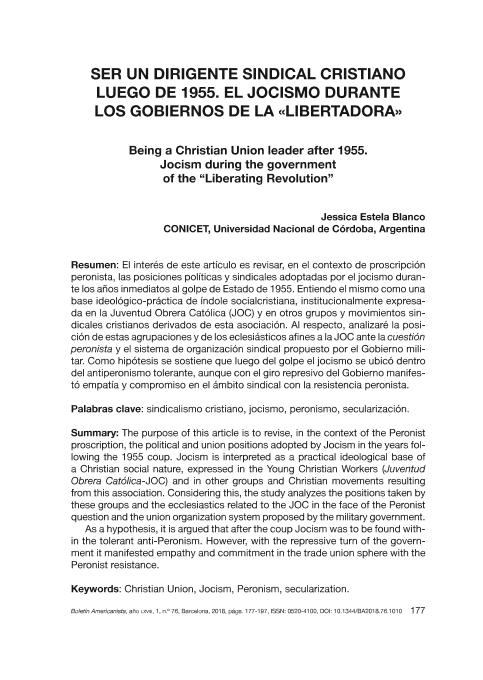Mostrar el registro sencillo del ítem
dc.contributor.author
Blanco, Jessica

dc.date.available
2022-08-05T14:18:32Z
dc.date.issued
2018-05
dc.identifier.citation
Blanco, Jessica; Ser un dirigente sindical cristiano luego de 1955: El Jocismo durante los gobiernos de la "Libertadora"; Universidad de Barcelona; Boletín Americanista; 76; 1; 5-2018; 177-197
dc.identifier.issn
0520-4100
dc.identifier.uri
http://hdl.handle.net/11336/164359
dc.description.abstract
El interés de este artículo es revisar, en el contexto de proscripción peronista, las posiciones políticas y sindicales adoptadas por el jocismo durante los años inmediatos al golpe de estado de 1955. Entiendo al mismo como una base ideológico-práctica de índole socialcristiana, institucionalmente expresada en la Juventud Obrera Católica (JOC) y en otros grupos y movimientos sindicales cristianos derivados de esta asociación. Al respecto, analizaré la posición de estas agrupaciones y de los eclesiásticos afines a la JOC ante la cuestión peronista y el sistema de organización sindical propuesto por el gobierno militar. Como hipótesis se sostiene que luego del golpe el jocismo se ubicó dentro del anti-peronismo tolerante, aunque con el giro represivo del gobierno manifestó empatía y compromiso en el ámbito sindical con la resistencia peronista.
dc.description.abstract
The purpose of this article is to revise, in the context of the Peronist proscription, the political and union positions adopted by Jocism in the years fol-lowing the 1955 coup. Jocism is interpreted as a practical ideological base of a Christian social nature, expressed in the Young Christian Workers(Juventud Obrera Católica-JOC)and in other groups and Christian movements resulting from this association. Considering this, the study analyzes the positions taken by these groups and the ecclesiastics related to theJOC in the face of the Peronist question and the union organization system proposed by the military government.As a hypothesis, it is argued that after the coup Jocism was to be found with-in the tolerant anti-Peronism. However, with the repressive turn of the govern-ment it manifested empathy and commitment in the trade union sphere with the Peronist resistance.
dc.format
application/pdf
dc.language.iso
spa
dc.publisher
Universidad de Barcelona

dc.rights
info:eu-repo/semantics/openAccess
dc.rights.uri
https://creativecommons.org/licenses/by/2.5/ar/
dc.subject
SINDICALISMO CRISTIANO
dc.subject
JOCISMO
dc.subject
PERONISMO
dc.subject
SECULARIZACIÓN
dc.subject.classification
Historia

dc.subject.classification
Historia y Arqueología

dc.subject.classification
HUMANIDADES

dc.title
Ser un dirigente sindical cristiano luego de 1955: El Jocismo durante los gobiernos de la "Libertadora"
dc.title
Being a christian Union leader after 1955: Jocism during the government of the “Liberating Revolution"
dc.type
info:eu-repo/semantics/article
dc.type
info:ar-repo/semantics/artículo
dc.type
info:eu-repo/semantics/publishedVersion
dc.date.updated
2022-08-03T18:19:29Z
dc.identifier.eissn
2014-993X
dc.journal.volume
76
dc.journal.number
1
dc.journal.pagination
177-197
dc.journal.pais
España

dc.journal.ciudad
Barcelona
dc.description.fil
Fil: Blanco, Jessica. Consejo Nacional de Investigaciones Científicas y Técnicas. Centro Científico Tecnológico Conicet - Córdoba; Argentina. Universidad Nacional de Córdoba. Facultad de Filosofía y Humanidades. Escuela de Historia; Argentina
dc.journal.title
Boletín Americanista
dc.relation.alternativeid
info:eu-repo/semantics/altIdentifier/url/https://revistes.ub.edu/index.php/BoletinAmericanista/article/view/17519
Archivos asociados
